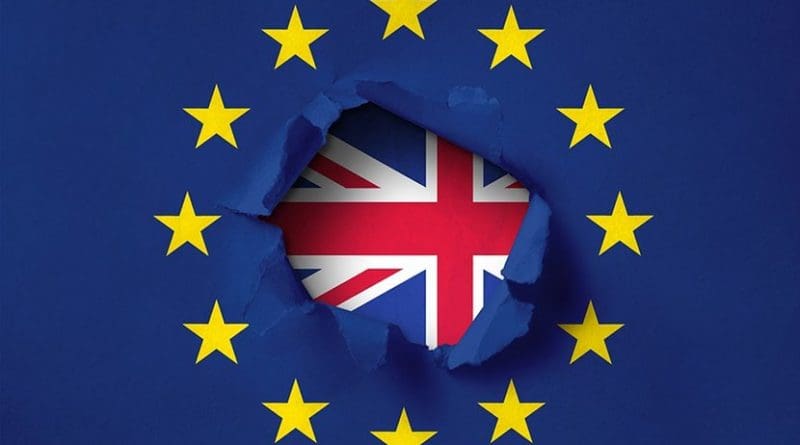Why Snap UK Poll May Not Banish Brexit Blues – OpEd
By Arab News
By Andrew Hammond*
The House of Commons on Tuesday voted for the first UK general election to be held in the month of December since 1923. While the ballot could be the most consequential in the postwar period, it may yet fail to resolve the vexed issue of the UK’s EU withdrawal.
As Prime Minister Boris Johnson this week reaches the end of his first 100 days in office, Tuesday’s vote is widely perceived as a victory for him, despite the major uncertainties that might now ensue, with a winter ballot at a time of unprecedented voter volatility. For much of the period since he entered Downing Street, Johnson has followed rather than set the agenda, but he now hopes to shape the campaign narrative around “getting Brexit done,” while Labour will try to broaden the agenda to other key domestic issues like the last decade’s legacy of public service cuts.
While MPs voted for a Dec. 12 ballot, a significant number of lawmakers are rightly concerned that a general election may not heal the country’s stark Brexit divisions and provide a pathway forward following the 2016 referendum. One reason for this is that much of the electorate is unenthused by the prospect of a third national election in just four years.
This undercurrent in public opinion was shown this week by an Ipsos Mori poll, which asked people whether they supported or opposed “an immediate general election.” While a plurality (44 percent) said they were in favor, 27 percent were opposed and 29 percent said they were neither in favor nor against, or that they did not know. These figures do not indicate a wellspring of popularity for a ballot. Indeed, more voters tend to think the best next step in the Brexit process should be a second referendum. YouGov, for instance, found 40 percent believe that a referendum would be the better way of ending the deadlock.
What many voters appear to be concerned about is the prospect of another Parliament in which no one party has a majority, or a government with only a small majority. As the last few years have shown, this can make it exceptionally hard for business to be agreed.
The polls also highlight the stark divisions between the “Remain” and “Leave” voters from 2016. Between a half and two-thirds of those who voted Remain in 2016 say that they support the forthcoming election. Yet those who voted Leave are much more divided, with many concerned that, if a Conservative-led government does not emerge post-ballot, there could be further delays, if not an outright rollback, of the EU withdrawal bill.
What this underlines is how difficult it will be, in the crucible of an intense election campaign, to engineer a national consensus amid the sea of debate and division about leaving the EU. This is not least because of the unprecedented voter churn, with nearly half the country (49 percent) voting for different parties across the three elections from 2010 to 2017.
One of the key challenges in this conversation across the UK remains the meaning of the 2016 referendum result. Johnson has made clear his strong view that sovereignty and “taking back control” were the primary drivers behind the victory, and therefore he appears relaxed about a sharper break from the EU than even his predecessor Theresa May.
However, the problem for Johnson in trying to forge a consensus is that there were, in fact, diverse and sometimes divergent views expressed by those who voted to exit the EU, let alone those who voted Remain. Contrary to what many Brexiteers like Johnson now insist, the Leave vote encapsulated a range of sentiments and there still is no consensus behind any single version of Brexit.
It is in this context that enlightened statesmanship — to educate the public on the facts and future options — is now needed, but the political dynamics of the election campaign may prevent this. On one pole, the ruling Conservatives appear intent on unifying around Johnson’s hard-line Brexit stance, and his ambition in the campaign is to neutralize Nigel Farage’s Brexit Party and win the backing of as many Leave voters as possible. Conversely, the Liberal Democrats, Scottish National Party, Plaid Cymru and the Greens will seek to make more political capital through their steadfast opposition to Brexit, and the possibility of repealing Article 50 to potentially stay in the EU. This stance has given these parties clearer differentiation against the Tories and Labour.
It may be that Labour has the biggest opportunity to bring the country together at the election, since its MPs represent many of the biggest Leave-backing and Remain-voting constituencies in the 2016 referendum. But, with much of the party faithful remaining instinctively pro-EU, and some 65 percent of Labour voters believed to have voted to Remain, the party is now seeking to hold a second referendum should it win power.
Taken overall, even if Brexit proves the defining battleground in the upcoming election, the outcome may not provide a clear pathway forward on the issue. This will be especially likely if there is a second successive Parliament with no party having a Commons majority, which could only deepen the political impasse in Westminster and fuel voter frustration.
- Andrew Hammond is an Associate at LSE IDEAS at the London School of Economics

